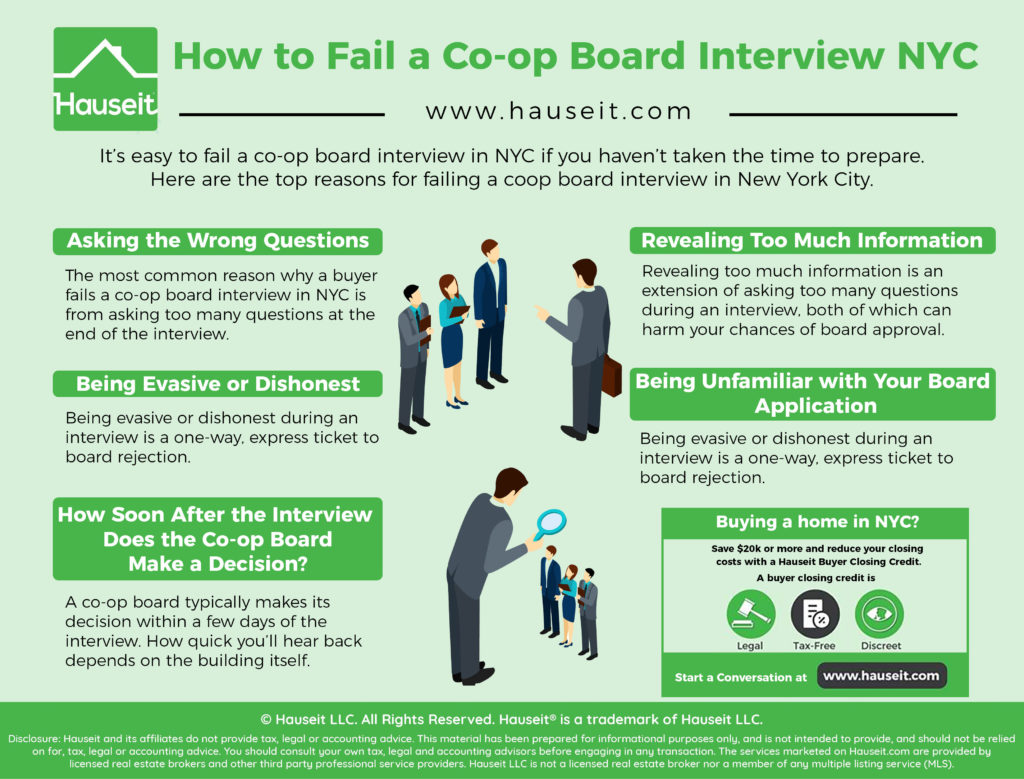It’s easy to fail a co-op board interview in NYC if you haven’t taken the time to prepare. Truth be told, the co-op board interview itself isn’t very difficult. Receiving an interview invitation actually means that the board has already conditionally approved your application, so the interview itself is simply the final step before receiving formal approval.
The main reason why many buyers fail the interview is that they don’t bother to do their homework and learn how to behave during the interview itself. Just like the board application itself, the interview is as much as test of your ability to follow instructions and be prepared as it is a test of your overall qualifications.
Table of Contents:

The most common reason why a buyer fails a co-op board interview in NYC is from asking too many questions at the end of the interview. As any seasoned buyer’s agent will tell you, you should never ask any questions at the end of the board interview even if you’re invited to do so.
Asking questions is a bad idea because they may naturally gravitate towards sensitive and controversial topics such as renovations or subletting. Asking questions can also leave you vulnerable to looking arrogant or entitled, especially if your questions are premised on receiving co-op board approval.
Even if you had an amazing interview, asking questions like “when can I close?” or “can I move in during weekends?” may still rub board members the wrong way.
It’s important to remember that many co-op board members take their jobs very seriously.
In some cases, it’s the only serious responsibility these individuals have. As such, they may be very sensitive to any conversation which makes them feel less powerful or important: such as you acting like you’ve already assumed that you will be approved.
Even though most co-ops permit renovations and some degree of subletting, asking about these topics during the interview is also a bad idea. This is because your lifestyle and renovation plans may impact some existing residents more than others.
If, for example, the unit you’re buying is above the board president’s apartment, he may selfishly not want to approve you if you happen to reveal your desire to do a 3 month gut renovation during the interview.
Get a 2% Rebate When You Buy
Save thousands on your home purchase with a buyer agent commission rebate from Hauseit
Revealing too much information is an extension of asking too many questions during an interview, both of which can harm your chances of board approval. Because the interview is simply the final seal of approval, there’s literally no upside in prolonging the interview by asking questions or sharing too much information.
This is because every time you lengthen the interview, you increase the chances of going off topic and touching upon sensitive or controversial things which may cause some of the interviewers to like you less or possibly consider rejecting you.
Just remember: this is not a job interview where the board is considering 10 other candidates.
You don’t have to outperform compared to another person, but rather you simply have to come across as a qualified, responsible and good natured person during the interview for the board to approve you.
If, for example, the board asks “do you have any relatives in NYC?”, you should answer NO if you don’t. Prolonging this answer by saying “No, but I have 3 nieces and nephews who are all under 6 who plan on visiting me every weekend and having play date sleepovers in my living room” will give the board members concern that you may be a noisy neighbor.
Save 2% On Your Home Purchase
Save thousands on your home purchase with a buyer agent commission rebate from Hauseit
Being evasive or dishonest during an interview (or on the purchase application itself) is a one-way, express ticket to board rejection. Even if a board member asks you a sensitive topic such as “do you plan on renovating the apartment?” you must not lie.
With that said, there is nothing misleading about responding like this: “As you know, the apartment is in very poor condition. I’m pretty sure the dishwasher is broken. I’m thinking about ways to make it more comfortable, but for now I do not have any concrete plans.”
Contrast the answer above with the following answer: “For starters, I’d like to add a vented washer/dryer. Does the building allow this? Also, am I allowed to do construction on weekends so I can finish things faster? I’m doing a total gut renovation and my contractor who I’ve already hired told me it will take 6 months to finish.”
Not being familiar with the information you included on your board application is a bad idea. Even if you genuinely don’t remember something in your application, the board may view this as you being dishonest, sketchy or simply unprepared (all of which are bad).
It’s a good idea to read over your entire board application before your interview.
Pay special attention to any confusing topics or other subject matters for which any reasonable third party may need to ask for clarification.
For example, a co-op board will usually be very curious if you own other real estate. This is because the co-op will want to make sure your debt-to-income ratio is robust enough to comfortably carry your new apartment and take care of your obligations on the other home, such as real estate taxes or common charges.
Therefore, you should be prepared to answer questions in the interview such as:
-
How much rent do you receive on your other home?
-
How much time is left on the lease?
-
What do you plan on doing with the property in the future?
A Full Service Listing for 1%
Sell your home with a traditional full service listing for just one percent commission.
A co-op board typically makes its decision within a few days of the interview. In some cases, the board decides immediately after the interview and shares the decision with the transfer agent. The transfer agent usually emails the buyer agent and/or the listing agent the following morning once they start work and begin answering emails.
In other cases, it can take up to a week for the co-op board to make a decision. There’s no way to predict how long the decision process takes, as each co-op operates differently. As such, there is no way to expedite or demand a status update after the interview. Simply be patient and you’ll find out soon enough!
Disclosure: Commissions are not set by law or any Realtor® association or MLS and are fully negotiable. No representation, guarantee or warranty of any kind is made regarding the completeness or accuracy of information provided. Square footage numbers are only estimates and should be independently verified. No legal, tax, financial or accounting advice provided.






